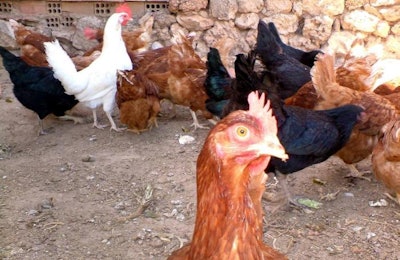
Using fewer natural resources and emitting less greenhouse gas than other food-producing animals, chickens represent an environmentally-friendly option for smallholders in developing countries as much as for Western agribusinesses.
From Kenya comes a success story from the Kenya Agricultural Productivity and Agribusiness Project (KAPAP), which supports people living in rural areas access new technology and markets as well as climate-smart approaches to farming. KAPAP is an initiative of the Government of Kenya, and it is supported by the World Bank.
How KAPAP has helped one farmer
One of 75 percent of Kenyans who make a living from agriculture, Mercy Wairimu is a typical person who has been helped by the project.
“I have been in this business for 10 years now,” she said. “I used to have a few small indigenous chickens here and there, running around my compound, but then the Kenya Agricultural Productivity and Agribusiness Project (KAPAP) came. It expanded my mind and my business. I now have 1,000 birds.”
With the larger and more efficient flock generating more income, the mother-of-three has been able to pay for the education of her family.
She is a member of a local farmers’ cooperative, partnered by KAPAP, which has offered training on sustainable poultry production, vaccines and provided the improved “Kroiller” chickens. These are more productive than the indigenous breeds in terms of eggs and meat, and they are robust enough to thrive under Kenyan conditions. Their droppings are used as fertilizer for crops. The cooperative has also helped producers to gain access to bigger markets; Mercy now sells her eggs to local supermarkets, not just to her family and neighbors.
“Supporting farmers so that they can earn good incomes and help build a sustainable, climate-smart food system is crucial to driving economic growth and boosting shared prosperity in Kenya,” said Dina Umali-Deininger, Africa Practice Manager with the Agriculture Global Practice at the World Bank.

















